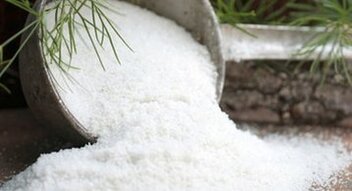
By Allison Adams
Maltodextrin is an artificial sugar that has a mild, sweet taste. Maltodextrin is also known as a polysaccharide and manufacturers create this artificial sugar by applying acids or other enzymes to cornstarch. Maltodextrin is a chain of repeating glucose molecules connected together. You can use this artificial sugar as an additive and a sugar substitute. Maltodextrin also has some purported risks associated with its use.
Structure of Maltodextrin
Maltodextrin contains D-glucose units linked in chains of variable length. Normally, these chains range from three to nineteen glucose units. The dextrose equivalent scale rates the percentage of reducing sugars in a sweetener. Maltodextrin scores between three and 20 on the DE scale. A high DE value indicates more sweetness, shorter chains and high solubility. A DE above 20 classifies a sweetener as a glucose syrup.
Maltodextrin is an artificial sugar that has a mild, sweet taste. Maltodextrin is also known as a polysaccharide and manufacturers create this artificial sugar by applying acids or other enzymes to cornstarch. Maltodextrin is a chain of repeating glucose molecules connected together. You can use this artificial sugar as an additive and a sugar substitute. Maltodextrin also has some purported risks associated with its use.
Structure of Maltodextrin
Maltodextrin contains D-glucose units linked in chains of variable length. Normally, these chains range from three to nineteen glucose units. The dextrose equivalent scale rates the percentage of reducing sugars in a sweetener. Maltodextrin scores between three and 20 on the DE scale. A high DE value indicates more sweetness, shorter chains and high solubility. A DE above 20 classifies a sweetener as a glucose syrup.
Production
Manufacturers can derive maltodextrin from any starch. In the United States, manufacturers primarily use corn, and in Europe, manufactures primarily use wheat. The term maltodextrin applies to any starch hydrolysis product containing less than 20 glucose units. For this reason, maltodextrin refers to a family of products, instead of a specific product. Wheat-derived maltodextrin may pose health concerns for individuals with celiac disease because of the gluten found in wheat-derived maltodextrin. However, in most cases, the maltodextrin production process completely removes the protein from the wheat resulting in a gluten-free wheat-derived maltodextrin.
Maltodextrin, Vitamins and Minerals
Maltodextrin is not a complex carbohydrate and, therefore, does not provide the long-term energy benefits of a true complex carbohydrate. Natural complex carbohydrates contain vitamins and minerals that help your body use the carbohydrate as energy. Maltodextrin, however, does not contain vitamin and mineral nutrients. Since maltodextrin is a very large molecule, your body will use its own supply of vitamins and minerals to assimilate the maltodextrin. This can potentially deplete your body of these very important vitamin and mineral nutrients.
Manufacturers can derive maltodextrin from any starch. In the United States, manufacturers primarily use corn, and in Europe, manufactures primarily use wheat. The term maltodextrin applies to any starch hydrolysis product containing less than 20 glucose units. For this reason, maltodextrin refers to a family of products, instead of a specific product. Wheat-derived maltodextrin may pose health concerns for individuals with celiac disease because of the gluten found in wheat-derived maltodextrin. However, in most cases, the maltodextrin production process completely removes the protein from the wheat resulting in a gluten-free wheat-derived maltodextrin.
Maltodextrin, Vitamins and Minerals
Maltodextrin is not a complex carbohydrate and, therefore, does not provide the long-term energy benefits of a true complex carbohydrate. Natural complex carbohydrates contain vitamins and minerals that help your body use the carbohydrate as energy. Maltodextrin, however, does not contain vitamin and mineral nutrients. Since maltodextrin is a very large molecule, your body will use its own supply of vitamins and minerals to assimilate the maltodextrin. This can potentially deplete your body of these very important vitamin and mineral nutrients.
Alleged Health Risks
The consumption of maltodextrin has similar side effects and health risks as most food additives. These side effects include allergic reactions, unexplained weight gain, bloating and flatulence. Specific allergic reactions associated with the use of maltodextrin include rash, asthma, itching and difficulty breathing. If you experience any allergic reaction or other side effect after consuming maltodextrin, you should discontinue use and consult with a medical professional.
The consumption of maltodextrin has similar side effects and health risks as most food additives. These side effects include allergic reactions, unexplained weight gain, bloating and flatulence. Specific allergic reactions associated with the use of maltodextrin include rash, asthma, itching and difficulty breathing. If you experience any allergic reaction or other side effect after consuming maltodextrin, you should discontinue use and consult with a medical professional.
Health Effects of Maltodextrin
By Joe King, M.S.
Maltodextrin is a polysaccharide sugar that is primarily used as a food additive. It is synthesized from starch and has the consistency of a fine white powder. Maltodextrin is made up of multiple glucose molecules linked together, and is mildly sweet to almost flavorless to the taste. It can be found in many types of beer and nutritional weight gainers to improve thickness, satiety, and mouth feel. There are both benefits and drawbacks to using maltodextrin, but it is considered generally safe in normal amounts.
Energy Production
The benefits of maltodextrin use are largely related to its use as a carbohydrate supplement by bodybuilders and athletes. Maltodextrin is often taken with dextrose, a simple sugar, to increase energy during exercise. Maltodextrin can increase energy by maintaining high levels of glucose in your blood stream, giving your muscles a constant source of energy during exercise. Since it is easily absorbed by your body, maltodextrin is used to increase weight gain, which is especially beneficial for bodybuilders.
Maltodextrin is a polysaccharide sugar that is primarily used as a food additive. It is synthesized from starch and has the consistency of a fine white powder. Maltodextrin is made up of multiple glucose molecules linked together, and is mildly sweet to almost flavorless to the taste. It can be found in many types of beer and nutritional weight gainers to improve thickness, satiety, and mouth feel. There are both benefits and drawbacks to using maltodextrin, but it is considered generally safe in normal amounts.
Energy Production
The benefits of maltodextrin use are largely related to its use as a carbohydrate supplement by bodybuilders and athletes. Maltodextrin is often taken with dextrose, a simple sugar, to increase energy during exercise. Maltodextrin can increase energy by maintaining high levels of glucose in your blood stream, giving your muscles a constant source of energy during exercise. Since it is easily absorbed by your body, maltodextrin is used to increase weight gain, which is especially beneficial for bodybuilders.
Cholesterol Levels
The use of maltodextrin may increase serum cholesterol levels due to its high calorie content. One half cup of maltodextrin contains about 190 calories and 49 g of carbohydrates, which may increase overall cholesterol in your bloodstream, particularly low-density lipoprotein, or "bad" cholesterol. High cholesterol may increase your risk of developing cardiovascular diseases such as hypertension, and it may increase your risk of heart attack or stroke. If you suffer from high cholesterol, consult your physician before using a product containing maltodextrin.
The use of maltodextrin may increase serum cholesterol levels due to its high calorie content. One half cup of maltodextrin contains about 190 calories and 49 g of carbohydrates, which may increase overall cholesterol in your bloodstream, particularly low-density lipoprotein, or "bad" cholesterol. High cholesterol may increase your risk of developing cardiovascular diseases such as hypertension, and it may increase your risk of heart attack or stroke. If you suffer from high cholesterol, consult your physician before using a product containing maltodextrin.
Hypoglycemia
High levels of maltodextrin intake have been associated with an increased risk for developing hypoglycemia, which occurs most often when maltodextrin is used as a performance-enhancing supplement. Hypoglycemia is a condition that occurs when your blood sugar levels are too low, which can occur after maltodextrin use by upsetting the balance of insulin and glucagon, two hormones that regulate blood sugar. When glucagon is present in your blood stream in large quantities, it depletes your blood sugar stores in your muscles and liver, causing a drop in blood sugar that may lead to dizziness, fatigue, headache, confusion, seizures, coma, and death.
Maltodextrin Allergy
Some individuals may experience an allergic reaction to maltodextrin use. An allergic reaction to maltodextrin is often the result of an adverse reaction to the base starch, glucose, that maltodextrin is made from. Individuals with allergies to wheat and corn are the most likely to experience an allergic reaction to maltodextrin because of their similar chemical structure. Symptoms of an allergic reaction include swelling of the throat and neck, the appearance of hives or a skin rash, heavy sweating, and difficulty breathing. If you begin to experience any of these effects following the ingestion of maltodextrin, seek medical attention immediately.
High levels of maltodextrin intake have been associated with an increased risk for developing hypoglycemia, which occurs most often when maltodextrin is used as a performance-enhancing supplement. Hypoglycemia is a condition that occurs when your blood sugar levels are too low, which can occur after maltodextrin use by upsetting the balance of insulin and glucagon, two hormones that regulate blood sugar. When glucagon is present in your blood stream in large quantities, it depletes your blood sugar stores in your muscles and liver, causing a drop in blood sugar that may lead to dizziness, fatigue, headache, confusion, seizures, coma, and death.
Maltodextrin Allergy
Some individuals may experience an allergic reaction to maltodextrin use. An allergic reaction to maltodextrin is often the result of an adverse reaction to the base starch, glucose, that maltodextrin is made from. Individuals with allergies to wheat and corn are the most likely to experience an allergic reaction to maltodextrin because of their similar chemical structure. Symptoms of an allergic reaction include swelling of the throat and neck, the appearance of hives or a skin rash, heavy sweating, and difficulty breathing. If you begin to experience any of these effects following the ingestion of maltodextrin, seek medical attention immediately.

















